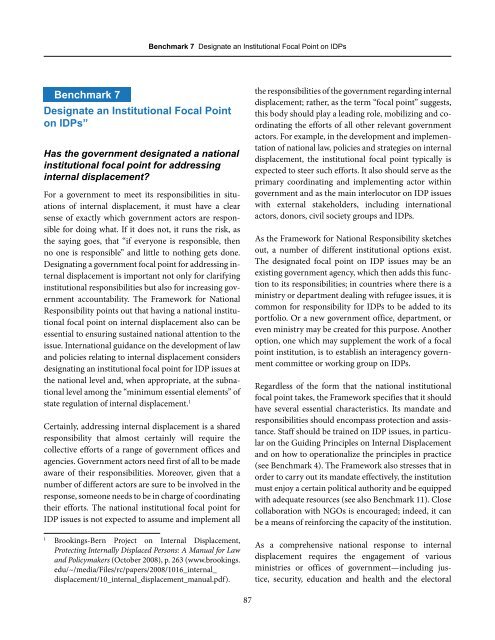From Responsibility to Response: Assessing National - Brookings
From Responsibility to Response: Assessing National - Brookings
From Responsibility to Response: Assessing National - Brookings
Create successful ePaper yourself
Turn your PDF publications into a flip-book with our unique Google optimized e-Paper software.
Benchmark 7<br />
Designate an Institutional Focal Point<br />
on IDPs”<br />
Has the government designated a national<br />
institutional focal point for addressing<br />
internal displacement?<br />
For a government <strong>to</strong> meet its responsibilities in situations<br />
of internal displacement, it must have a clear<br />
sense of exactly which government ac<strong>to</strong>rs are responsible<br />
for doing what. If it does not, it runs the risk, as<br />
the saying goes, that “if everyone is responsible, then<br />
no one is responsible” and little <strong>to</strong> nothing gets done.<br />
Designating a government focal point for addressing internal<br />
displacement is important not only for clarifying<br />
institutional responsibilities but also for increasing government<br />
accountability. The Framework for <strong>National</strong><br />
<strong>Responsibility</strong> points out that having a national institutional<br />
focal point on internal displacement also can be<br />
essential <strong>to</strong> ensuring sustained national attention <strong>to</strong> the<br />
issue. International guidance on the development of law<br />
and policies relating <strong>to</strong> internal displacement considers<br />
designating an institutional focal point for IDP issues at<br />
the national level and, when appropriate, at the subnational<br />
level among the “minimum essential elements” of<br />
state regulation of internal displacement. 1<br />
Certainly, addressing internal displacement is a shared<br />
responsibility that almost certainly will require the<br />
collective efforts of a range of government offices and<br />
agencies. Government ac<strong>to</strong>rs need first of all <strong>to</strong> be made<br />
aware of their responsibilities. Moreover, given that a<br />
number of different ac<strong>to</strong>rs are sure <strong>to</strong> be involved in the<br />
response, someone needs <strong>to</strong> be in charge of coordinating<br />
their efforts. The national institutional focal point for<br />
IDP issues is not expected <strong>to</strong> assume and implement all<br />
1 <strong>Brookings</strong>-Bern Project on Internal Displacement,<br />
Protecting Internally Displaced Persons: A Manual for Law<br />
and Policymakers (Oc<strong>to</strong>ber 2008), p. 263 (www.brookings.<br />
edu/~/media/Files/rc/papers/2008/1016_internal_<br />
displacement/10_internal_displacement_manual.pdf).<br />
Benchmark 7 Designate an Institutional Focal Point on IDPs<br />
87<br />
the responsibilities of the government regarding internal<br />
displacement; rather, as the term “focal point” suggests,<br />
this body should play a leading role, mobilizing and coordinating<br />
the efforts of all other relevant government<br />
ac<strong>to</strong>rs. For example, in the development and implementation<br />
of national law, policies and strategies on internal<br />
displacement, the institutional focal point typically is<br />
expected <strong>to</strong> steer such efforts. It also should serve as the<br />
primary coordinating and implementing ac<strong>to</strong>r within<br />
government and as the main interlocu<strong>to</strong>r on IDP issues<br />
with external stakeholders, including international<br />
ac<strong>to</strong>rs, donors, civil society groups and IDPs.<br />
As the Framework for <strong>National</strong> <strong>Responsibility</strong> sketches<br />
out, a number of different institutional options exist.<br />
The designated focal point on IDP issues may be an<br />
existing government agency, which then adds this function<br />
<strong>to</strong> its responsibilities; in countries where there is a<br />
ministry or department dealing with refugee issues, it is<br />
common for responsibility for IDPs <strong>to</strong> be added <strong>to</strong> its<br />
portfolio. Or a new government office, department, or<br />
even ministry may be created for this purpose. Another<br />
option, one which may supplement the work of a focal<br />
point institution, is <strong>to</strong> establish an interagency government<br />
committee or working group on IDPs.<br />
Regardless of the form that the national institutional<br />
focal point takes, the Framework specifies that it should<br />
have several essential characteristics. Its mandate and<br />
responsibilities should encompass protection and assistance.<br />
Staff should be trained on IDP issues, in particular<br />
on the Guiding Principles on Internal Displacement<br />
and on how <strong>to</strong> operationalize the principles in practice<br />
(see Benchmark 4). The Framework also stresses that in<br />
order <strong>to</strong> carry out its mandate effectively, the institution<br />
must enjoy a certain political authority and be equipped<br />
with adequate resources (see also Benchmark 11). Close<br />
collaboration with NGOs is encouraged; indeed, it can<br />
be a means of reinforcing the capacity of the institution.<br />
As a comprehensive national response <strong>to</strong> internal<br />
displacement requires the engagement of various<br />
ministries or offices of government—including justice,<br />
security, education and health and the elec<strong>to</strong>ral

















